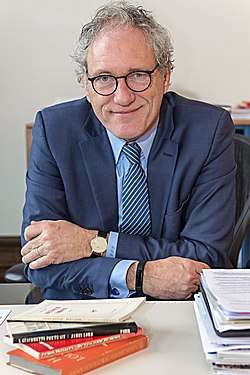Thom de Graaf
Thomas Carolus "Thom" de Graaf (Dutch pronunciation: [ˈtoːmɑz də ˈɣraːf];[1] born 11 June 1957) is a Dutch politician of the Democrats 66 (D66) party and jurist. He is the Vice-President of the Council of State since 1 November 2018.
De Graaf attended the City Gymnasium Nijmegen from April 1969 until May 1975 and applied at the Radboud University Nijmegen in June 1975 majoring in Law obtaining an Bachelor of Laws degree in June 1977 and worked as a student researcher before graduating with an Master of Laws degree in July 1981. De Graaf served on the Municipal Council of Nijmegen from May 1978 until April 1979. De Graaf worked as a researcher at the Radboud University Nijmegen and the Centre for Parliamentary History from July 1981 until September 1985. De Graaf worked as a civil servant for the Ministry of the Interior from September 1985 until May 1994 for the department for Law Enforcement from September 1985 until February 1986 and as Deputy Director-General of the department for Legislative Affairs from February 1986 until August 1988 and as Deputy Director-General of the department for Legal Affairs from August 1988 until September 1991 and as Deputy Director-General of the department for Law Enforcement from September 1991 until May 1994. De Graaf served on the Municipal Council of Leiden from April 1990 until May 1994.
De Graaf was elected as a Member of the House of Representatives after election of 1994, taking office on 17 May 1994 serving as a frontbencher and spokesperson for the Interior, Kingdom Relations, and Law enforcement and deputy spokesperson for Foreign Affairs and European Affairs. After the Parliamentary leader of the Democrats 66 in the House of Representatives Gerrit Jan Wolffensperger announced that he was stepping down as Parliamentary leader in the House of Representatives following increasing criticism on his leadership, the Democrats 66 leadership approached De Graaf as his successor, De Graaf accepted and became the Parliamentary leader in the House of Representatives, taking office on 21 November 1997. After the election of 1998 the new Leader of the Democrats 66 Els Borst was elected as a Member of the House of Representatives and became the Parliamentary leader, taking office on 19 May 1998. Following the cabinet formation of 1998 Borst opted to remain Minister of Health, Welfare and Sport in the Cabinet Kok II and unexpectedly announced that she was stepping down as Leader. De Graaf announced his candidacy to succeed her. De Graaf won the leadership election defeating fellow frontbencher Roger van Boxtel and was elected as Leader and Parliamentary leader, taking office on 30 May 1998. For the election of 2002 De Graaf served as the Lijsttrekker (top candidate). The Democrats 66 suffered a big loss, losing 7 seats and fell back as the seventh largest party and now had 7 seats in the House of Representatives. For the election of 2003 De Graaf served for a second time as Lijsttrekker. The Democrats 66 suffered another loss, losing 1 seat and now had 6 seats in the House of Representatives. On 22 January 2003 De Graaf announced he was stepping down as Leader and Parliamentary leader taking responsibility for the defeat but continued to serve in the House of Representatives as a frontbencher chairing the parliamentary committee for Kingdom Relations. Following the cabinet formation of 2003 De Graaf was appointed as Deputy Prime Minister and Minister for Governmental Reform and Kingdom Relations in the Cabinet Balkenende II, taking office on 27 May 2003. On 23 March 2005 De Graaf resigned after a proposed constitutional reform on elected-mayors was rejected by the Senate.
De Graaf semi-retired from active politics and became active in the public sector and occupied numerous seats as a nonprofit director on several supervisory boards (Centre for Parliamentary History, Consumers' League and the Anne Vondeling prize) and served on several state commissions and councils on behalf of the government (Public Pension Funds APB, De Koning Commission, Nationaal Comité 4 en 5 mei, Netherlands Film Fund and the Advisory Council for Spatial Planning). De Graaf also worked as a sport administrator for the Royal Dutch Football Association. De Graaf also served as a professor of Ethics for the Royal Marechaussee at the Royal Military Academy from July 2005 until September 2010. In December 2006 De Graaf was nominated as Mayor of Nijmegen, taking office on 8 January 2007. In January 2012 De Graaf was nominated as Chairman of the Executive Board of the Universities of Applied Sciences association, he resigned as Mayor the same day he was installed Chairman from serving from 1 February 2012 until 1 November 2018. De Graaf was elected as a Member of the Senate after the Senate election of 2011, taking office on 7 June 2011 serving as a frontbencher chairing the parliamentary committee for Kingdom Relations and spokesperson for the Interior, Kingdom Relations, European Affairs, Defence and Immigration and Asylum Affairs. After the Senate election of 2015 De Graaf was selected as Parliamentary leader of the Democrats 66 in the Senate, taking office on 9 June 2015. In June 2018 De Graaf was nominated as Vice-President of the Council of State, he resigned as Parliamentary leader on 26 June 2018 and as a Member of the Senate on 20 September 2018 and was installed as Vice-President of the Council of State, taking office on 1 November 2018.
Early life and education
De Graaf was born in Amsterdam and studied law at the Catholic University Nijmegen where he obtained his LL.M. in 1981. He was a member of the House of Representatives in the period 1994-2003, where he also held the post of party leader and faction chairperson for D66 from 1997 onward. He sat as vice-chairman in the parliamentary inquiry commission that looked into the investigative methods used by the Dutch inter-regional police force, leading to the resignation in 1994 of the Minister for Internal Affairs, Ed van Thijn.
Political career
De Graaf served in the second Balkenende cabinet as Deputy Prime Minister and Minister for Government Reform and Kingdom Relations from 23 May 2003 until 23 March 2005. In 2005, de Graaf resigned, after the introduction of democratically elected mayors had been rejected in the Senate, with a deciding vote cast by the Labour Party faction under guidance by Ed van Thijn. The proposal was especially important as it had become a symbol of the government reform that D66 had wanted since its creation. Alexander Pechtold took his place in the cabinet.
From 8 January 2007 until 1 February 2012, De Graaf was mayor of Nijmegen, as successor of Guusje ter Horst. De Graaf's father, Theo de Graaf, was a Catholic People's Party member of parliament and from 1968 until 1977 mayor of Nijmegen. Since 1 February 2012 Thom de Graaf is President of the HBO-raad.
Decorations
| Honours | ||||
| Ribbon bar | Honour | Country | Date | Comment |
|---|---|---|---|---|
| Knight of the Order of the Holy Sepulchre | Holy See | 4 April 2004 | ||
| Officer of the Order of Oranje-Nassau | Netherlands | 23 May 2005 | ||
References
- Thomas in isolation: [ˈtoːmɑs].
External links
| Wikimedia Commons has media related to Thom de Graaf. |
- Official
- (in Dutch) Mr. Th.C. (Thom) de Graaf Parlement & Politiek
- (in Dutch) Mr. Th.C. de Graaf (D66) Eerste Kamer der Staten-Generaal
| Party political offices | ||
|---|---|---|
| Preceded by Gerrit Jan Wolffensperger |
Parliamentary leader of the Democrats 66 in the House of Representatives 1997–1998 1998–2003 |
Succeeded by Els Borst |
| Preceded by Els Borst |
Succeeded by Boris Dittrich | |
| Leader of the Democrats 66 1998–2003 | ||
| Preceded by Els Borst 1998 |
Lijsttrekker of the Democrats 66 2002 • 2003 |
Succeeded by Alexander Pechtold 2006 |
| Preceded by Roger van Boxtel |
Parliamentary leader of the Democrats 66 in the Senate 2015–2018 |
Succeeded by Hans Engels |
| Political offices | ||
| Preceded by Johan Remkes |
Deputy Prime Minister 2003–2005 Served alongside: Gerrit Zalm |
Succeeded by Laurens Jan Brinkhorst |
| Preceded by Roelf de Boer | ||
| Preceded by Office established |
Minister for Governmental Reform and Kingdom Relations 2003–2005 |
Succeeded by Alexander Pechtold |
| Preceded by Guusje ter Horst |
Mayor of Nijmegen 2007–2012 |
Succeeded by Wim Dijkstra Ad interim |
| Preceded by Piet Hein Donner |
Vice-President of the Council of State 2018–present |
Incumbent |
| Civic offices | ||
| Preceded by Gerlach Cerfontaine |
Chairman of the Supervisory board of the Netherlands Film Fund 2017–2018 |
Succeeded by Laetitia Griffith |
| Non-profit organization positions | ||
| Preceded by Jos van Kemenade |
Chairman of the Supervisory board of the Centre for Parliamentary History 2007–present |
Incumbent |
| Preceded by Guusje ter Horst |
Chairman of the Executive Board of the Universities of Applied Sciences association 2012–2018 |
Succeeded by Maurice Limmen |


